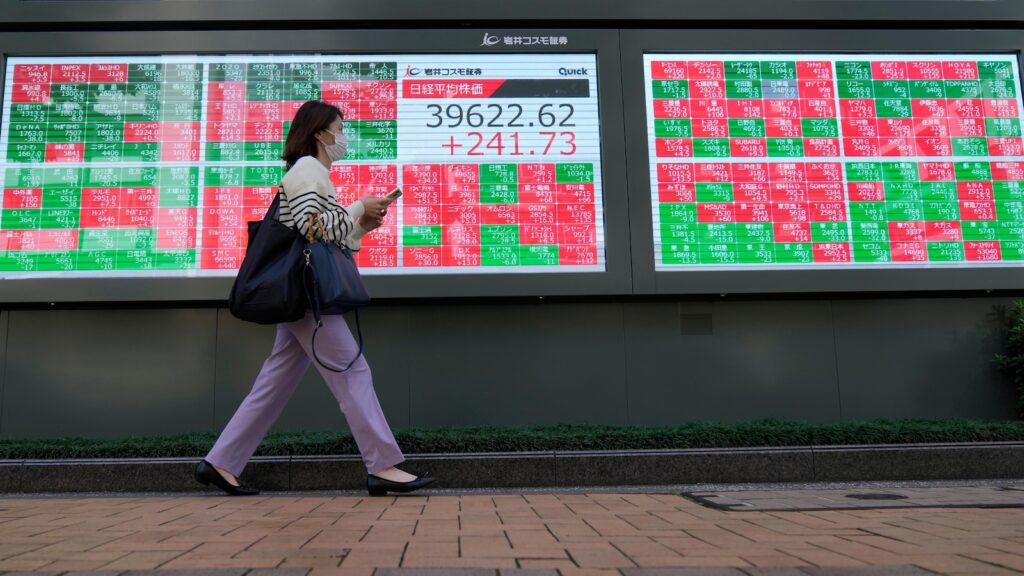BANGKOK — World shares were mixed on Tuesday after Wall Street rolled to more records, with Hong Kong’s benchmark losing more than 3%.
Oil prices shed more than $3 a barrel.
Germany’s DAX gained 0.3% to 19,564.16, while the CAC 40 in Paris dropped 0.7% to 7,547.36. Britain’s FTSE 100 lost 0.5% to 8,253.07.
The futures for the S&P 500 and the Dow Jones Industrial Average fell less than 0.1%.
Chinese shares extended losses after the government reported late Monday that growth in exports fell sharply in September, adding to signs of weakness in the economy.
The Shanghai Composite index lost 2.5% to 3,201.29, while the Hang Seng in Hong Kong gave up 3.7% to 20,318.79.
Weaker than expected data on lending and prices have undermined already fragile market sentiment that has wavered as investors await fresh details on the government plans for stimulus to help rev up the economy.
“Market participants continue to seek for clarity around fiscal stimulus support from Chinese authorities, but the lack of commitment remains a source of reservation for risk-taking in Chinese equities,” Yeap Jun Rong of IG said in a commentary.
Tokyo’s Nikkei 225 index gained 0.8% to 39,910.55, while the Kospi in Seoul gained 0.4% to 2,633.45.
In Australia, the S&P/ASX 200 was up 0.8% to 8,318.40.
Also early Tuesday, the dollar fell to 148.89 Japanese yen from 149.83 yen. The euro rose to $1.0915 from $1.0911.
U.S. benchmark crude dropped $3.73 to $70.10 per barrel. Brent crude, the international standard, skidded $3.79 to $73.67 per barrel.
“The oil market is on a wild ride, caught in a whirlwind of geopolitical tension, OPEC+ strategy shifts and a slowdown from its biggest customer, China,” Stephen Innes of SPI Asset Management said in a report. China’s usual growth in demand of about 600,000 barrels per day has fallen to 200,000 barrels.
Despite uncertainty over how conflict in the Middle East might affect oil supplies, “the real threat to crude isn’t war, it’s oversupply,” he said, noting that many oil exporters are committed to ramping up their output.
Besides oil, prices also have been falling for copper and other commodities that a healthy Chinese economy would devour.
On Monday, Wall Street rolled to more all-time highs.
The S&P 500 climbed 0.8% to build on its record set on Friday, closing at 5,859.85. The Dow Jones Industrial Average rose 0.5% to 43,065.22, adding 201 points to its own record. The Nasdaq composite gained 0.9% to 18,502.69.
The gains followed relatively quiet trading in Europe, while the U.S. bond market remained closed for the day because of a holiday.
This week will have few top-tier economic reports outside of an update Thursday on sales at U.S. retailers. That leaves the emphasis on corporate earnings reports, which will pick up the pace this week after big banks began the reporting season last week.
Bank of America, Johnson & Johnson and UnitedHealth Group will all report their latest results on Tuesday. Later in the week will come United Airlines, Netflix, American Express and Procter & Gamble.
Analysts expect S&P 500 companies to deliver overall growth of 4.1% in earnings per share for the latest quarter from a year earlier, according to FactSet. If they’re correct, it would be a fifth straight quarter of growth.
Stocks have broadly rallied to records on relief that interest rates are finally heading back down, now that the Federal Reserve has widened its focus to include keeping the economy humming instead of just fighting high inflation.
Recent reports showing the U.S. economy remains stronger than expected have also raised optimism that the Fed can pull off a perfect landing where it gets inflation down to 2% without causing a recession that many had thought would be necessary.
